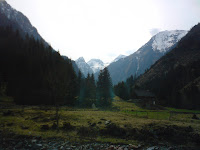This post is a continuation of my
previous entry about our excursion to the Austrian countryside. The much larger farm I was speaking about belongs to
Manfred Gerl and his family. We were on "Holiday on farm" without even knowing it... It was good... In the evening I went out to the balcony and what I heard was a complete silence. It was a big difference compared to the rush of the Austrian capital - no cars, no music from the neighbors (what I hear right now). Nothing but silence. Re-freshening!
In the morning the ladies from the Gerl family served us a "personal" breakfast. They asked us what we want, how the eggs should be cooked. Everything we wished. This was again a big difference what I have seen so far compared to the "regular" hotels.

After the breakfast we had a tour around the farm with the farm owner as our personal guide. It was interesting to see the differences compared to the
7 Little Goats farm. This was also a family farm, but with much higher number of animals (cca. 40 cows and a larger flock of sheep), which inevitably requires a good mechanization.
Our time ran fast and we had still lot of things to see. We said a farewell to the family and went on to our next stop. It was the
Gumpenstein research station again. Because of time pressure we haven't seen their sheep and goats the day before. They have a nutrition research experiment up and running for goat grazing. More interesting than the project itself was the person who guided us - an older guy with a "
Hulk Hogan" beard. I don't remember his name since I have a terrible memory for this. At one point he said: "If you don't have any problem, buy a goat!" Obviously a sheep person...
Although sheep and goats are similar (from the animal breeding point of view) there is a huge difference in their "personality". Goats are very curious, even stubborn. They go where they want, do what they want. The direct opposite are the sheep with their flocking instinct. Easy to scare, easy to manipulate. It might be that I am simplifying the things too much, but this behavior was obvious also on the
7 Little Goats farm, where we met both species in close quarters. While the goats almost jumped off from their place, the sheep immediately rushed to the farest corner of the barn.
I am (moderately) for the goats! :)
Next stop: The agricultural show. This was a unique opportunity, since they celebrated 100 years of animal breeding in the region. Perfect weather, beautiful environment. What else to wish for?!
Free entry! Definitely! In this we got a huge help from "Hogan" who negotiated it for us. (This guy has really good connections around there, since he was able to do the same trick previous evening, saving us the entry fee for an hour long dance in the local disco club.)
As you would expect there were plenty of cattle around. Not just for fun, but actually to take part in a serious competition, a sort of beauty contest. Skilled evaluators searched for the best animals mostly considering their type traits - their exterior. As one of them said, he was searching for the "modern cow", the one that is the prime example how the breed should look like in the future.
Also here was something extremely interesting, but as usual, the whole happening went on behind the scenes. If you imagine a
Miss competition, the inevitable part is the photo shooting. It is not different in animals either. But while the young ladies go before the objective willingly, in cows could be a slight problem. So here is the question: How a 70 kg owner forces his cow with its 600 kg body mass to stand on one place in a specific pose, if she does not want. The answer: With patience.
Much patience.
If you don't have to do this personally, it is quite funny to see people trying to move the cow's leg in order to take a nice shot of the udder. The person moves the cows leg. The cow puts it back. Our guy moves the leg again. The cow puts it back. The guy moves it again. The cow decides to go for a short walk - for a change. And this went on at least 10 minutes before they actually made it.
Later in the afternoon we had to move, as always. This time we started our trip back to Vienna. As we were in the mountains we also made a little hike to an ancient Roman style church nearby. I don't have any photos of that church (which is a pity), so I give you the view to the valley.
This church is not used for quite some time now, but still kept tidy fom inside and outside. As we were so close, we also went to see the other church they had in the same village. This was originally also a Roman one, but finished (or renovated?) in Gothic style with a cemetery around it.
Here came the last surprise on this extraordinary trip. In the basement of the church we could see a pile of human skulls and bones. As we (the non-Austrians) were told, these bone were dug out from the old graves, cleaned and put to their final rest to a separate place. In this way the local people deal with the lack of burrial places. Very strange... In
my country, which is just around the corner, it is unacceptable to dig out somebody from the grave. And judging from the comment of my other colleague from Tirol this is not unusual in the mountain regions of Austria. Very strange... It seems that I have still lot to learn about this country.



















